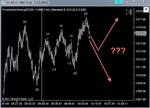I'm talking about directional trading here.
I understand that with arbitrage or spreading against different instruments, you can find one market thats out of line with another and lock in some profit. That makes sense.
But when you trading directionally, you are trying to predict the future. You are saying, "I'm going long here because I think in the future, the buying pressure will overwhelm the selling pressure and price will rise." And vice-versa for short. You need to use your price/volume analysis or indicators or whatever to help you determine that. But how do you do it?
To steal a picture from DT's webinar:
I understand that with arbitrage or spreading against different instruments, you can find one market thats out of line with another and lock in some profit. That makes sense.
But when you trading directionally, you are trying to predict the future. You are saying, "I'm going long here because I think in the future, the buying pressure will overwhelm the selling pressure and price will rise." And vice-versa for short. You need to use your price/volume analysis or indicators or whatever to help you determine that. But how do you do it?
To steal a picture from DT's webinar:


